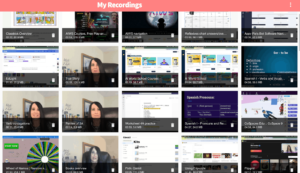Jeff Hunt’s #VSS2010 Review
Jeff Hunt went to the Virtual Schools Symposium, and here is his take on the event.
At lunch a cast of presenters outlined the status of their programs. Michael Horn of the Innosight Institute and co-author of Disrupting Class summarized the state of technology and online learning in schools:
- Technology improves faster than our lives change, but it needs to be upwardly scalable to affect our lives.
- Online learning is becoming increasingly blended or hybrid.
- Students need a supervised place to learn, whether in a classroom or online.
- Communication and interaction is improved between teachers and students with video conferencing.
- Hybrid courses consider how we will look at the teacher’s role.
- Content is changing in different ways: gaming and modularization
- Schools should be using Data differently, not punitive, but informing. What learning happens next?
- What is the role of mobile learning? It will open doors to students who had nothing. The content and courses will be low quality at first.
The Keeping Pace Report breakout session outlined the state of online learning across the U.S. The highlights from the session:
- Policy is the enabler. State legislation in Florida has allowed online education to explode in that state. During the past year, course enrolments have grown rom 154,000 to 214,000. Every student has a right to attend FL Virtual. Only one-third of Florida’s schools offer AP courses. Policy is more significant than budget. During tight budget, programs are reduced or cut . With supportive state policy, system must work for students. Florida is performance based. The state pays when student passes course. School district does not write check.
- In fulltime statewide virtual schools, AZ, OH, PA have the most enrollments, with approximately 200,000 students and approximately 1 million course enrollments.
- With district online programs, the number is unknown but the best guess is the 1.5 million students are taking courses in those programs.
- Emerging issues:
- Blended learning
- School turnarounds
- Competency-based learning
- Mobile Learning
On Monday evening, conferees were treated to a networking dinner on the floor of the University of Phoenix stadium (the home field of the NFL’s Arizona Cardinals).
On Tuesday morning, Bob Wise, former governor of West Virgina, and Jim Shelton , Assistant Deputy Secretary at the US Department of Education, delivered the morning’s Keynote address.
Wise, along with co-chair Jeb Bush — former governor of Florida — lead the Alliance for Excellence in Education. Gov. Wise is a strong advocate of addressing the needs of all students. He sees three issues challenging schools:
- Shrinking state revenues
- Teacher shortages
- Increase global demands
He proposed that these issues can be addressed with online learning and that they address further educational challenges:
- access for all students
- funding
- high quality digital content and instruction
- how to issue course credit
- accountability for results of learning
Gov Wise left the conferees with one resounding challenge: Be boldy innovative or badly irrelevant!
Shelton stated that the half-life of skills is now shorter than ever.
While education is a state responsibility, the federal department can watch innovations in schools, pull them out, and develop them to scale. The federal department is the single largest source of educational funding.
With the Elementary and Secondary Act, the legislation recognizes that the answers are in the communities The federal government must be prescriptive in some cases, but it can attach money to results and give financial incentives to spread those results. Yet, the politicians realize that their aspirations stronger than the resources
For online learning, he stated:
- Technology has ability to extend power of teaching to personalize learning.
- In education 0.1% spent on research — power of analytics to understand what’s happening is essential to improvement
- Online movement is fledgling and not assured to succeed. Barriers to success are political.
As with any conference, some breakout sessions were not up to the level of their abstracts and vendors stepped outside their roles of informers to sellers.
VSS planned and executed another conference to highlight the state of online learning, display its biggest stars, and look to a bright future of online learning.
Related articles
- Next-Gen Platforms (VSS day 2) (edreformer.com)
- Virtual Schools Symposium November 12-16 (edreformer.com)
- How to enforce safe search with google search cse (mclear.co.uk)
- iNACOL Announces Updated National Report: A National Primer on K-12 Online Learning, Version 2 (prnewswire.com)
- Tom Vander Ark: Better Tools and Better Schools (huffingtonpost.com)
- 10 Ideas for Improving Online Learning (edreformer.com)
- Virtual School Symposium Online & Blended Learning Conference (edreformer.com)
- Douglas Levin: Executive Director, SETDA (edreformer.com)
- Study: Online undergrads learn well without strong class bond (scienceblog.com)
- Video: Rose Fernandez, Parent, State of Wisconsin (edreformer.com)
- Pearson and Florida Virtual School Announce Agreement (prweb.com)






0 Comments
Leave a Comment
Your email address will not be published. All fields are required.